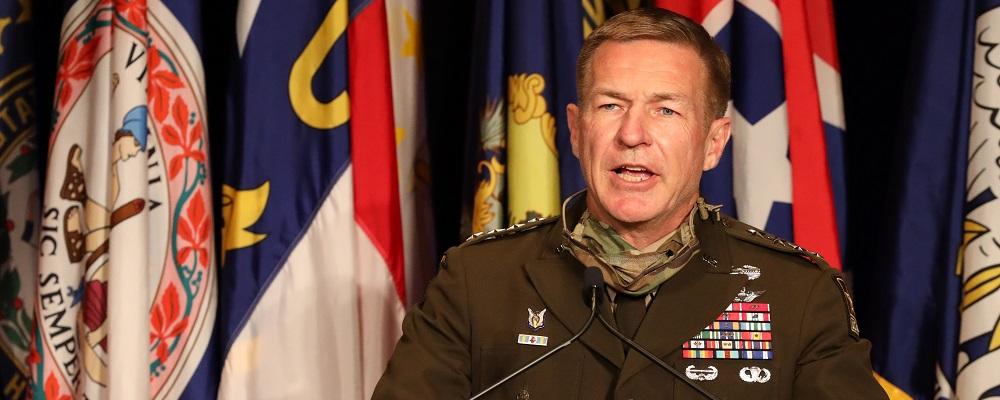
The Army’s top officer said he has been in awe of the efforts of Guardsmen over the past year and reinforced the idea that the National Guard was an integral part of the nation’s defense strategy into the future.
Gen. James C. McConville, the Army chief of staff, was the keynote address for the first day of the 142nd General Conference, which was livestreamed to more than 3,000 current and former National Guard officers around the world.
He began by noting the many challenges the Guard has faced in the past year, from COVID-19 and civil unrest to wildfires, hurricanes and the ongoing conflicts in Afghanistan and Iraq.
“Thank you. Thank you to the entire National Guard across all the states and territories,” McConville said. “I am so proud of everything you have done to support our hometowns, our communities and our nation.”
Guardsmen across the nation moved quickly when needed, performing important medical and logistical support in the face of the deadly pandemic. They served in the toughest places, McConville said, doing whatever tasks were required.
The Guard has been an important tool for their states and nation and remains critical to the success of the Army as a whole, he said.
“The Army could absolutely not do what it does without the National Guard,” McConville said, adding that this past year made that even clearer.
Because of that, McConville said the Guard would be an important part of the ongoing Army transformation that is being pushed by the National Defense Strategy and a focus on Great Power competition.
McConville said the Army must change now to preserve the overmatch that is needed for future fights and it can’t move incrementally.
The last transformation of this size, he noted, came after the Vietnam War as the Army developed new organizations, added new warfighting systems and changed doctrine to reflect future needs.
“We’re now reaching the limits of the technologies and designs we developed in the 1970s and the conditions we face, the threats we face have changed,” McConville said.
Today, the Army is implementing its mutlidomain operations concept, calibrating force posture and creating new task forces.
The Guard is part of those efforts, notably with the creation of the 54th Security Force Assistance Brigade and the expansion of cyber units. The force has also tested a key personnel system, the Integrated Personnel and Pay System-Army, that will eventually be fielded across all three components.
Another, older Guard program, the State Partnership Program, will also be key to the Army’s future efforts, McConville said.
“I want to thank you for your hard work building and maintaining these important connections,” he said.
McConville said he was incredibly proud of the efforts of Guard soldiers, both amid domestic missions and as they return to training for future fights. He pledged that in the future, those soldiers would not be forced to deploy with outdated equipment when compared to their active counterparts.
Guard units will be among the first to field the Army’s newest weapon systems, he added, from new rifles to future vertical lift.
“We need to make sure that our National Guard soldiers who are deploying have the best equipment, whatever the mission is,” McConville said.
